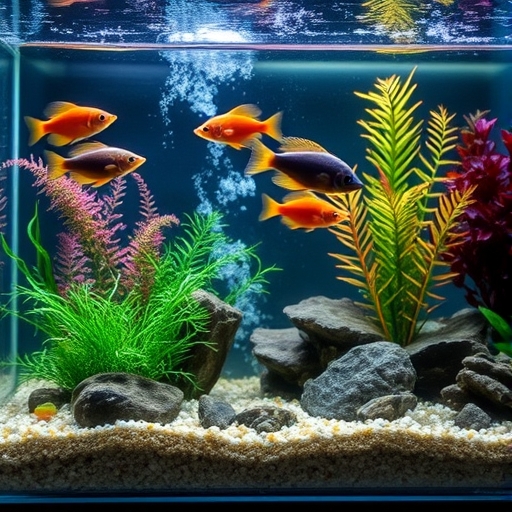Why Does My Aquarium Stink?
Keeping an aquarium can be a rewarding hobby, but it comes with its own set of challenges. One of the most common issues that aquarium owners face is unpleasant odors emanating from their tanks. A stinky aquarium can be a sign of underlying problems that need to be addressed promptly. In this article, we will explore the various reasons why your aquarium might stink and provide solutions to help you maintain a healthy and odor-free aquatic environment.
Understanding Aquarium Odors
Before diving into the specific causes of aquarium odors, it’s essential to understand what types of smells you might encounter and what they signify.
Common Types of Aquarium Odors
- Rotting or Decaying Smell: Often associated with decomposing organic matter, such as uneaten food or dead fish.
- Sewage or Sulfur Smell: This odor may indicate an accumulation of waste, particularly from anaerobic bacteria.
- Chemical Smell: A strong chemical odor can be a sign of an imbalanced tank or the presence of harmful substances.
- Fish stress and illness
- Algal blooms
- Increased waste buildup
- Unpleasant odors
- Overfeeding your fish leads to leftover food that sinks and decays.
- Fish produce waste that can accumulate if not properly filtered or removed.
- Feed Sparingly: Only provide as much food as your fish can consume in a few minutes.
- Regular Cleaning: Use a siphon to remove uneaten food and waste from the substrate during routine water changes.
- Dead or dying leaves can rot, releasing foul-smelling compounds into the water.
- Regular Pruning: Trim dead or decaying leaves promptly.
- Monitor Plant Health: Ensure your plants are healthy and thriving to reduce decay.
- Filters that are too small or not functioning correctly can fail to remove waste effectively.
- Upgrade Your Filter: Choose a filter that is appropriate for your tank size and bioload.
- Regular Maintenance: Clean or replace filter media as recommended by the manufacturer.
- Stagnant water can lead to anaerobic conditions, promoting the growth of odor-causing bacteria.
- Add an Air Pump: Increase aeration to improve oxygen levels in the water.
- Surface Movement: Ensure your filter creates surface movement to enhance gas exchange.
- Overcrowding can overwhelm the biological filtration system, leading to waste buildup.
- Follow Stocking Guidelines: Adhere to the recommended fish-to-gallon ratio for your tank size.
- Rehome Fish: If necessary, consider finding new homes for some of your fish.
- Excess nutrients, particularly nitrates and phosphates, can lead to algal growth.
- Control Nutrients: Regularly test your water for nitrate and phosphate levels and perform water changes as needed.
- Limit Light Exposure: Reduce the amount of light your tank receives to slow algal growth.
- An imbalance of bacteria can lead to the proliferation of harmful species that produce foul odors.
- Cycle Your Tank: Ensure your aquarium is fully cycled before adding fish.
- Use Bacterial Supplements: Consider adding beneficial bacteria supplements to restore balance.
- Daily: Check water parameters (pH, ammonia, nitrite, nitrate).
- Weekly: Perform partial water changes (10-20%).
- Monthly: Clean the substrate and filter.
- Filter: Ensure your filter is appropriately sized for your tank and regularly maintained.
- Heater: Maintain a stable temperature to support fish health and reduce stress.
The Importance of Maintaining Water Quality
A clean and well-maintained aquarium is crucial for the health of your fish and the overall ecosystem. Poor water quality can lead to various problems, including:
Common Causes of Odors in Aquariums
1. Excess Food and Waste
One of the primary reasons for a smelly aquarium is the accumulation of uneaten food and fish waste.
How It Happens:
Solutions:
2. Decomposing Plant Matter
If you have live plants in your aquarium, decaying leaves can contribute to unpleasant odors.
How It Happens:
Solutions:
3. Poor Filtration
An inadequate filtration system can lead to a buildup of waste and organic matter, resulting in foul odors.
How It Happens:
Solutions:
4. Lack of Aeration
Aquariums require adequate oxygen levels to support beneficial bacteria that help break down waste.
How It Happens:
Solutions:
5. Overcrowding
Too many fish in a tank can lead to increased waste production and stress among the inhabitants.
How It Happens:
Solutions:
6. Algal Blooms
Algae can thrive in poorly maintained aquariums, contributing to unpleasant smells.
How It Happens:
Solutions:
7. Bacterial Imbalances
A healthy aquarium relies on a balanced population of beneficial bacteria to break down waste effectively.
How It Happens:
Solutions:
Maintaining a Healthy Aquarium
To prevent odors and maintain a healthy aquarium, follow these best practices:
Regular Maintenance Schedule
Water Quality Testing
Invest in a good water testing kit to monitor:
| Parameter | Ideal Range | Importance |
|---|---|---|
| pH | 6.5 – 7.5 | Affects fish health and behavior |
| Ammonia | 0 ppm | Toxic to fish at any concentration |
| Nitrite | 0 ppm | Toxic to fish; should be undetectable |
| Nitrate | < 20 ppm | High levels can promote algae growth |
Choosing the Right Equipment
Fish Compatibility
Select fish species that are compatible in terms of temperament, size, and environmental needs to reduce stress and waste production.
FAQ
Why does my aquarium smell like rotten eggs?
This odor is often caused by hydrogen sulfide gas produced by anaerobic bacteria in the substrate. It usually indicates a lack of oxygen or excessive waste buildup. To resolve this, increase aeration and perform a thorough cleaning of the substrate.
How often should I clean my aquarium?
You should perform partial water changes every week (10-20%) and clean the substrate and filter media monthly. Regular maintenance will help prevent odors and keep your tank healthy.
Can I use chemicals to eliminate odors?
While some chemical treatments can reduce odors, they may not address the underlying problems. It’s best to identify and rectify the root cause rather than relying solely on chemicals.
What should I do if my fish are stressed?
Stress can result from poor water quality, overcrowding, or incompatible tank mates. Assess your tank conditions, and make necessary adjustments to alleviate stress.
Is it normal for my aquarium to have a slight odor?
A well-maintained aquarium may have a slight organic smell, but it should not be overpowering or foul. If you notice strong odors, investigate the potential causes listed in this article.
Conclusion
A stinky aquarium is often a sign of underlying issues that need to be addressed to maintain a healthy aquatic environment. By understanding the potential causes of odors and implementing regular maintenance practices, you can keep your aquarium clean and odor-free. Remember that the key to a successful aquarium is consistency in care and attention to water quality. With the right approach, you can enjoy the beauty and tranquility of your aquarium without the unpleasant smells.





